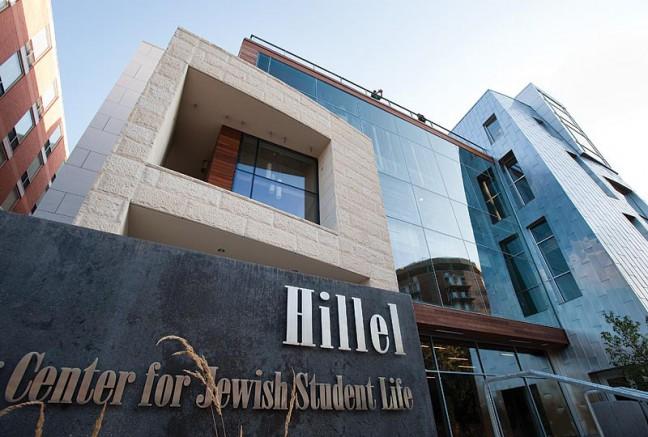The University of Wisconsin Frozen Meals Program recently announced a third location for meal pickups at UW Hillel on Wednesdays from 4 to 6 p.m., expanding their mission to combat food insecurity on campus.
UW Hillel is a center for Jewish life on campus and is located at 611 Langdon Street. The program will continue offering meal pickups at The Crossing on Tuesdays from 3 to 5 p.m. and Fridays from 12 to 2 p.m., and at Pres House on Mondays and Thursdays from 3 to 5 p.m, according to University Housing registered dietitian Agnes Sherman.
“Hillel has been a great partner, and they’ve been very motivated and very enthusiastic about participating in this program,” Sherman said. “Not only are they doing the partnership with us, but they’re also performing kind of the same concept with kosher meals so that students who do need a kosher meal can also have that availability when they go into their distribution time.”
UW created the Frozen Meals Program in order to reach out to students experiencing food insecurity, Sherman said. The program also aims to reduce both food waste and food insecurity across campus and the greater Madison area, according to their Facebook page.
New public initiative to document Wisconsin Latinx history involves five UW campuses
Sherman said the program uses leftover food that UW Housing chefs and staff determine is appropriate to repackage and serve as a frozen meal. UW sends food to a central packaging hub where a program director or student dietitian takes inventory and determines what could compose a whole meal, Sherman said.
Sherman said an American Family Dreams Foundation grant funds the program.
“Even if we didn’t have that grant, we would still be supportive of this program and continue it regardless because we know it’s an important piece on campus,” Sherman said. “Housing makes a commitment that if there isn’t something that could make a complete meal, we supplement that at our own cost to make sure it is a complete meal.”
Sherman said the Frozen Meals program prioritizes food safety, so the process takes place within a span of multiple days. Sherman said the program chose to offer frozen meals because they are easier to distribute and can be held for a longer period of time.
Their new partnership with UW Hillel means more opportunities for students on campus to access meals, especially during COVID-19, according to the program’s Facebook page.
The Frozen Meals Program is not UW Hillel’s first partnership to fight food insecurity. They also work with Feed the Change, Open Seat and Madison Community Fridges to address food insecurity on campus and in the community, UW Hillel Springboard Social Justice Fellow Shelby Fosco said.
UW releases second round of federal financial aid to students, opens application process
“We know that when students’ basic needs are being met, they are more likely to persist through till graduation,” Fosco said. “So if that means providing free meals to students who need them, that is what we are going to do.”
Fighting food insecurity is a central element of Jewish tradition and education, Fosco said. Fosco said “Pirkei Avot,” a book of ethical Jewish teachings which states “it is not your duty to finish the work, but neither are you at liberty to neglect it,” can be viewed as a guiding practice for the volunteer work at UW Hillel.
Before the pandemic, volunteers helped package meals for the Frozen Meals Program, but currently only a student dietitian and the programs’ student directors Samantha Visintainer and Liz James package the meals.
“This year, we had to really think of how we were going to be safely and effectively able to distribute these meals, so we came up with the plan of having the set distribution times that we advertise on our social media,” Visintainer said. “That way, we are still giving students opportunities throughout the entire week at different times that best suit their schedule to pick up these meals while also trying to remain as safe as possible with the pandemic.”
When the program halted in March 2020 at the onset of the COVID-19 pandemic, Sherman said her organization served over 4,000 meals.
Despite the limited population on campus this year, students still pick up meals, Sherman said. The program already served 4,000 meals before winter break following the 2020 fall semester, Sherman said.
“There’s still a need,” Sherman said. “Food insecurity is potentially a big factor for a lot of students currently because of the pandemic, so we’re hoping to continue to be a good campus partner in this program, and we’ll do whatever we can to see how many other opportunities there [are] to expand the satellite locations.”
Visintainer said she wants students to know the program emphasizes anonymity and operates with a system of self-identification of food insecurity. To acquire a frozen meal, students simply must visit one of their distribution sites, Visintainer said.
Sherman said the Frozen Meal Program hopes to expand and move to more satellite locations in the future. Before it can make those expansions, the program must first determine the efficiency and accessibility of proposed areas, Sherman said.
“If there are students who are facing insecurities, please reach out to the Dean of Students Office,” Sherman said. “They are the resource to be going to to get the information to help them … and I think they’re very supportive of programs that run like this and are committed to helping students if they can.”
For more information on meal pickup locations, updates and volunteer opportunities, follow @frozenmealsuw on Instagram and UW Frozen Meals Program on Facebook.














